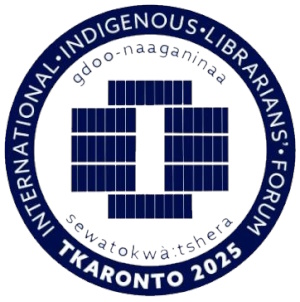International Indigenous Librarians’ Forum 2025
Date
June 17, 2025 05:30 - June 20, 2025 14:30
Location
Toronto
Details
Website: https://iilftoronto.com
Theme: Gdoo-naaganinaa (Our Dish) / Sewatokwà:tshera (Dish with One Spoon)
We invite Indigenous people working in galleries, libraries, archives and museums (GLAM) from around the world to submit proposals to the 2025 International Indigenous Librarians’ Forum in Toronto (June 17-20, 2025). The forum theme will be Our Dish/Dish with One Spoon, which is an important teaching and treaty between the Anishinaabek Nation and Haudenosaunee Confederacy to care for the Lands on which Toronto is located. For those considering submission to our call, please note that all proposals must have an Indigenous lead presenter. We are seeking contributions rooted in Indigenous pedagogies and practices that seek to disrupt the conference/forum presentation format. As such, we invite various formats of presentation, which may include storytelling, dance, song, creative or interpretive texts, images, videos, audio or other formats.
What is Our Dish/Dish with One Spoon?
Gdoo-naaganinaa (Our Dish in Anishinaabemowin) also known as sewatokwà:tshera (Dish with One Spoon in Kanien:ke’ha) is a treaty and teaching for those engaging in all that sustains us on these Lands and Waters, on the Great Lakes. Dean Jacobs and Victor Lytwyn (2020), historians and scholars from Bkejwanong First Nation (Walpole Island First Nation), remind us that the creation of the Dish with One Spoon was both a peace treaty and an assertion of friendship and Sovereignty between the Anishinaabeg and the Haudenosaunee Nations. Our Dish is an affirmation of the long-standing responsibilities of these Nations to share governance and care for the Lands and Waters on which the International Indigenous Librarians’ Forum will take place. This teaching calls on us to consider how we approach the Lands and Waters that constitute the Dish, which are the Great Lakes, and the Spoon in mutuality and relationality. To formalize this treaty, the Haudenosaunee Nation created a wampum belt, which is a “visual memory keeper that mark[s] significant events and codif[ies] agreements (Hill, 2020)”. The image represented at the top of this page is of the Dish with One Spoon wampum. Ryan DeCaire (2020), Kanien:ke’ha professor from Wáhta First Nation, shares the following about the teaching:
“In the centre of the wampum is a bowl. There’s a small spot in the middle of it that represents a beaver tail, which refers to the beaver as sustenance for our people. The wampum talks about how we all have a title to everything on earth in order to sustain ourselves. You don’t cause any bloodshed in taking what you need. You always leave something there in that bowl for future generations.”
Leanne Simpson (2008), a Michi Saagig Nishnaabeg scholar, tells us that Our Dish was based on two important Anishinaabeg philosophies, Bimaadiziwin and Mnjikanming. Bimaadziwin is a call to live a good life, while Mnjikanming is a practice of the Mississauga Nation in which those from the Fish Clan meet with our more-than-human kin, in this case the Fish Nation (Simpson, 2008). Both Nations’ teachings challenge us to think about our own contributions to what we now know as Toronto, which we extend to you, as relatives and visitors coming to IILF.
